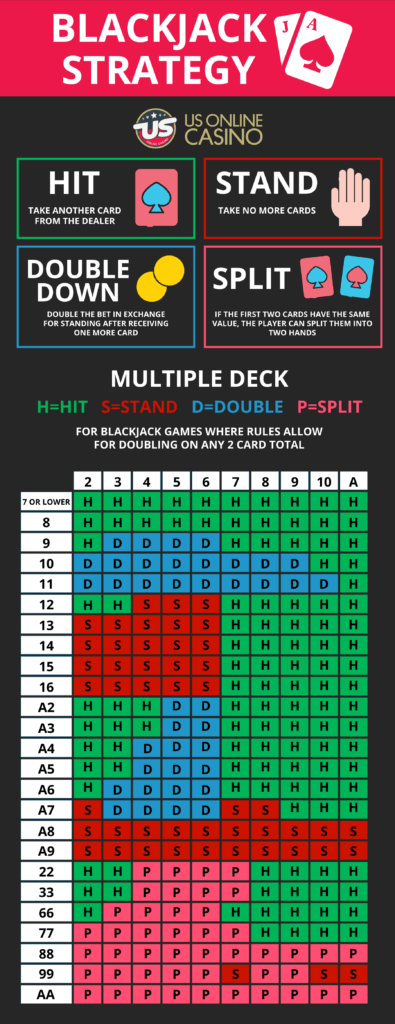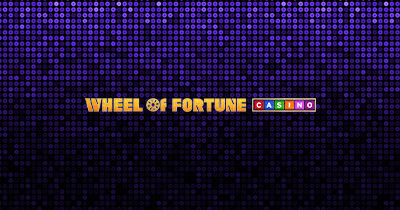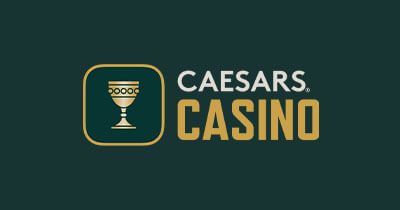BlackJack Strategy
Learn the Top Online Blackjack StrategiesBlackjack is one of the easiest casino games to master, but a good strategy is the key to winning big. Learn the best s blackjack strategies in our helpful guide below.
A strategy guide is fundamental to any serious BlackJack player. BlackJack is a favorite game of many casino players, from newbies to very experienced old guards. The simplicity of rules – get as close as you can to 21 without going over – invites novices, while the advanced strategy and betting options keep experienced players coming to the BlackJack table.
Although the game is associated with the number 21, we think you’d do better focusing on the number 10. Your key to winning BlackJack is in creating a strategy around the likelihood of drawing a card valued at 10. These are the most common cards in the deck, so statistically, they deserve the most focus.
What is the most important rule in Blackjack strategy?
Everyone focuses on the number 21 in BlackJack, which is the wrong focus. Secondarily, they focus on the ace, which is also wrong.
As far as the number 21, your goal in BlackJack is not to total the value of your cards to 21. And don’t let the name fool you. The point of BlackJack is not getting blackjack.
The point of BlackJack is beating the dealer. Not other players. Not your personal best. Just the dealer.
Second, because of a fixation on blackjack, many players focus too much on the ace. Aces are great. They can be 1 or 11, and you need them to get blackjack. But tossing away winners because you’re taking a dumb chance on blackjack is a recipe for a short night of BlackJack.
Focus on beating the dealer. Or, if you prefer, focus on not losing to the dealer. That is strategy rule #1.
Why are 10-valued cards so important in BlackJack?
Once you loosen up from your fixation on aces and blackjacks, you’re placed to start winning. And the key to winning in BlackJack is this:
The 10s are your friends.
In a deck of 52 cards (or using software replicating those 52 cards), you are most likely to get a card valued at 10. This includes:
- 4 10s
- 4 Jacks
- 4 Queens
- 4 Kings
So that’s 16 of the 52 cards. Getting two of those gets you a super strong 20. There are also 4 aces (which gets you blackjack, or 21), 4 9s giving you a strong 19, and 4 8s that get you 18. Therefore, if you’ve been dealt a 10 and neither the other players nor the dealers have any of these cards, there are 27 of the remaining 50 cards (the dealer already has 2) that get you at least an 18.
An 18 is a strong hand in itself, and it’s difficult to beat without going bust.
So you see why 10s are your friends.
Application: Holding a hand of 10 points
The value of 10, or having a hand of 10 points, is statistically even more helpful than having a single 10-valued card in hand.
Let’s look at a scenario where you have been dealt 10 points. You’re holding two cards with a total value of 10 (we’ll say 7 and 3).
When dealt a value of 10, you’ll definitely take a hit (obviously); nothing can hurt you and anything will help you. What are the likely odds in these scenarios?
If you’re dealt a 7 and 3, you’ve already got 2 of the 32 cards out of the way that won’t help you as much (the numbered cards, other than 10). This means 20 cards remaining will give you either BlackJack or 20. And you should be able to see if other players or perhaps the dealer is holding any of those (although this depends upon whether your version of BlackJack requires that the dealer shows both her cards when dealing).
But an 8 or 9 would also get you a strong hand of 18 or 19. So in total, there are 28 cards that could get you an 18 or better, and you can rule out your 7 and 3 as well as any other cards that you can see.
Holding 10 points, you’d still stand to draw any of the 10s or face cards and get 20. On the other hand, another player or the dealer may get these as well. This is part of the excitement of the game!
Easy Rules for BlackJack
The following are some rather dependable rules for playing BlackJack. We wish we could say that they’ll always win for you, but we can’t. We can say that they are statistically very likely.

When Should You Double Down?
New BlackJack players love doubling down. They seem to enjoy saying the words, “Double Down!” so much that it offsets the loss they receive when they double down on bad bets!
You are, of course, free to double down whenever you darn well, please. But these are some times when it is safest to double down (not 100% guaranteed, but odds are in your favor).
Always double down on a hard 10 or 11
First of all, a hard 11 means that it cannot change in value from 11. An ace is a soft 11 since it can also be 1 point. A hard 11 is any combination of cards whose sum is 11 that does not have an ace.
For example, if you have a 7 and 4, you should double down regardless of the dealer’s hand. Why? Again the likelihood of getting one of the 16 10-valued cards. BlackJack if you’re holding 11, and a very strong 10 if you’re already holding 10.
Of course, if you see other players or the dealer holding 10-point cards, that will decrease your likelihood. But the general rule is, “Always double down on hard 10 or 11.”
Double down strategies when the dealer has low cards
You are also at a statistical advantage when the dealer has low cards. (In truth, low cards aren’t great news for anyone, but we’re doing this one at a time.) Let’s look at 3 strategies that are statistically advantageous for you.
Double down with 9 against the dealer’s low cards
If you’re holding a hard 9 and the dealer is showing a 6 or lower, it’s considered a good bet to double down. If the dealer has a 10 in the hole (that is, the unseen card), she’ll be at 16 and will have to hit. Any card 6 or over would be a bust. If there’s a lower card in the hole, she’s unlikely to get a good hand.
The 9 that you’re holding, however, gets you 19 with a 10, 20 with an ace, and stands to improve better without going bust than lower cards.
Holding a soft 13-17 against the dealer’s low cards
Whenever you’re dealt an ace, it’s good news because it can change value between 1 and 11. If you’re also dealt a 2-6 card (giving you a soft 13-17), you should double down if the dealer is showing a 5 or 6. You don’t want to stay with those cards as they would only win if the dealer busts and they’re not terribly likely to at 5 or 6.
If you receive the statistically-likely 10, you’d reduce that ace to a 1-point card, and you’d get a hard 13-17. Probably not a winner, so you hope the dealer busts. But if you’re holding a 2, ace, and are dealt an 8, you get BlackJack, 7 gets you 20, and so forth.
Should you double down with a soft 18?
If you’re dealt an ace and 7, it is tempting to stick with that soft 18. But statistically, it might make more sense to double down since it’s soft. At least you know you can’t bust.
If the dealer is holding a 3-6, chances are they’ll bust trying to beat you after you double down. If you draw a 10-point card and get that hard 18, the dealer will probably bust trying to beat you. A 3 would get you blackjack, and 2 renders 20, which is still a great hand.
When Should You Split Pairs?
Along with doubling down, splitting is one of the least understood topics in BlackJack. Splitting doubles your winnings, and there are times when it makes great sense to do it.
Splitting is smart, and there are statistically-reliable guidelines for when you should do it. To learn all you need to know about splittings, see our article, “When to Split Pairs in Blackjack: a Definitive Strategy Guide.”
Conclusion
As you see, basing your strategy around the statistic likelihood is the foundation of your Blackjack strategy. The likelihood that you or the dealer would draw that card steers your strategy (or it should!).
It is key that you keep your opponent – the dealer – in mind as you’re playing. You should be mindful of other players only because the cards they showing indicate what is not likely to be in the deck.
As you’re learning the strategies above, start out with the ones that are more or less unchanging: stick on a hard 18-20 and double down on a hard 10 or 11. The other rules depend on what the dealer is holding. Rather than just having some rules to memorize, if you study this guideline you’ll understand the logic behind those rules.
When you’re trying to minimize the house edge, you want to make good decisions, and not make bad ones. Following this advice will get you playing your strongest.
Good luck!




